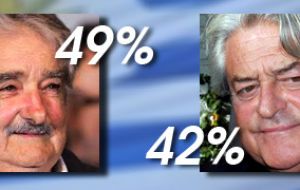MercoPress. South Atlantic News Agency
Polls show 7 points lead for Uruguayan incumbent presidential candidate
 Mujica only need to retain their first round votes
Mujica only need to retain their first round votes Uruguay’s ruling coalition presidential ticket, --Jose Mujica and Danilo Astori--, has a seven percentage points advantage over the opposition, Luis Alberto Lacalle and Jorge Larrañaga, for the run off the last Sunday of November, according to the latest opinion polls released in Montevideo
Pollster Factum has the Mujica ticket ahead with 49% of vote intention; Lacalle, 42% while 9% remain undecided. This means that the ruling Broad Front coalition retains its 48,5% vote of the first round while Mr. Lacalle has been able to add 13 percentage points to his 29% showing at the end of October.
The Uruguayan electoral system demands that the winning candidate in the first round must have 50% of the vote plus one, if not a run off at the end of November decides who will be the future president of Uruguay.
Oscar Bottinelli head of Factum said that many of the undecided belong to the junior opposition Colorado party, in spite of the fact their current leader announced he would be supporting Mr. Lacalle in the run off.
Regarding the Independent party and its 2.4% share of the vote, according to Factum most of them will support the opposition candidate in spite the fact that their leader Pablo Mieres did not opt for any of the two presidential candidates.
Bottinelli said that while the ruling coalition ticket main effort will be to ensure the first round support for the run off, the opposition ticket besides ensuring its supporters will have to attract voters from the other parties.
“It’s not an automatic response that the junior opposition party will whole-heartedly support the senior opposition National Party. It’s not as simple as that”, pointed out Bottinelli.
Meanwhile analysts are trying to sort out what went wrong in the first round for the National party which only managed 29% of the vote and actually lost benches to other opposition parties, mainly their opposition junior Colorado partners.
This was particularly intriguing since at the primaries held at the end of June, the National party, based on a 50% turnout of the electorate garnered an additional one point over the ruling Broad Front, both in the low forties.
Since then the National party slid to 29%, while the ruling coalition ticket climbed to 48.5% ensuring a legislative majority and almost avoiding a November run off.
Apparently according to political analyst Claudio Paolillo, the followers of Senator Larrañaga who lost the primaries to Lacalle did not fully support the ticket particularly outside Montevideo where half of Uruguay’s electorate resides.
Larrañaga followers are more left leaning than Conservative former president Lacalle and there was irritation over the ranking in the Senate list.
Under extreme pressure from his wife and family, Lacalle placed his son in the sixth place to the Senate, which forced a reshuffling of names and inevitably hurt feelings particularly among long standing leaders from outside Montevideo and with strong support in their areas of influence.
This was somewhat confirmed by the results in some departments (provinces) which have been traditionally National party turf and the Broad Front came ahead and the Colorado party emerged from virtually non existence in 2004 to a 20/25% of the vote.
This analysis will be tested next May when the 19 departments will be holding elections to name “intendentes” (mayors) and local councils.
Currently 8 out of 19 provinces are ruled by the Broad Front, but last October 25th, in eleven out of 19 a majority of votes went for the incumbent presidential candidate.
Last June when the primaries with the exception of Montevideo and Canelones, which were solid Broad Front, the rest of the country was mostly pro opposition, which does not match with what happened at the end of October.
Next May will therefore be the big test to see how many provincial governments the ruling coalition manages to retain.




Top Comments
Disclaimer & comment rulesCommenting for this story is now closed.
If you have a Facebook account, become a fan and comment on our Facebook Page!